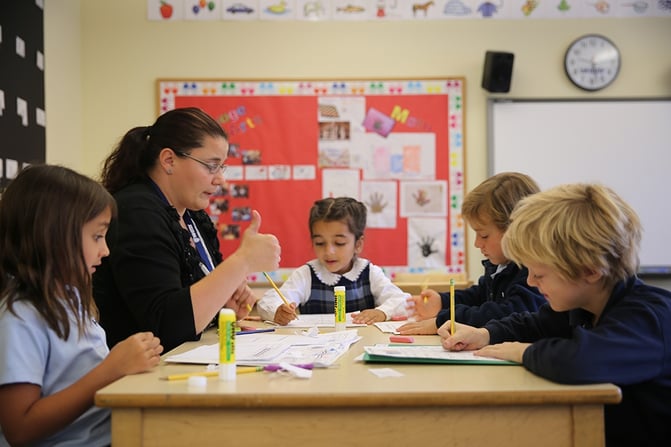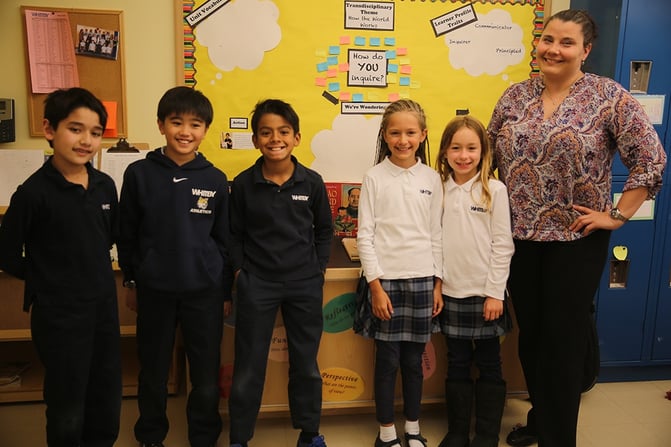"Don’t pick a job with great vacation time. Pick one that doesn’t need escaping from."
As I’m getting ready to facilitate an IB PYP (Primary Years Programme) workshop in Denver this weekend for new and experienced PYP coordinators from all around the world, I wanted to highlight and share four things I have the great privilege to do on a daily basis here in my role at Whitby.
All IB World Schools must appoint a curriculum coordinator. Usually, the PYP coordinator is recruited from the teaching staff at the school. A criterion is that this person should have proven teaching ability and be able to act as a pedagogical leader of the programme in the school, as cited in Making the PYP Happen-Pedagogical Leadership in a PYP School.

The Role of the PYP Coordinator
1. The PYP coordinator ensures the continuity of the programme through developing systems and documentation. This includes mapping the transdisciplinary program of inquiry, unit planners, daily planners, policy documents, guidelines for verification and evaluation, and continuum initiatives.
The ‘Written Curriculum’ is one of the 7 IB programme standards. PYP coordinators at IB World Schools spend a lot of time mapping the curriculum framework with various tools. Online tools such as ATLAS and Managebac, are two commonly used curriculum mapping software programmes. Strategic curriculum mapping supports schools to ensure that all the essential elements of the programme are planned, taught, assessed, and analyzed.
All teachers are encouraged to actively participate and be involved in developing the written curriculum at IB World Schools. This process includes practices such as writing and documenting Units of Inquiry, math, science, social studies, languages arts, world language, visual arts, music, PE scope and sequences, and yearlong and daily planners. Teachers are encouraged to provide feedback when the school is reviewing whole school policies such as on language and assessment.
Once per year all teachers in the school’s PYP continuum, including single subject teachers and specialists, come together to collaborate, review and refine the programme of inquiry (POI). Teachers take a deep look at the continuum within each transdisciplinary theme and ensure that there is an articulation and balance between the essential elements of the programme – knowledge, concepts, skills, attitudes and action. Based on the findings and reflection, teachers revisit the scope and sequence documents for different subject areas and make adjustments. These adjustments are then also reflected in all unit of inquiry and subject planners in order to always enhance teaching and learning for all students in our learning spaces.
2. A vital aspect of a PYP coordinator’s role is collaborative planning with all teachers. This requires a deep understanding of what constitutes a good collaborative learning team with its variety of roles
A commitment to collaborative planning is central to the philosophy of the PYP. The PYP coordinator has a pivotal role in this process and works to ensure that the standards for implementation are understood, and that the programme is planned, taught and assessed collaboratively. At Whitby we have a very strong (and exceptional!) collaborative culture and the evidence is all the ‘magic’ that happens in and around all of the classrooms and learning spaces every day.
When you walk into any PYP classroom in an IB World School, you will always see students actively engaged in various learning explorations and observe clear differentiation happening to ensure all students feel successful and challenged. You will see them inquiring, collaborating and cooperating in small and whole group settings around a plethora of topics and you will be amazed by the level of independence and commitment to any task at hand.
IB World School students live their school’s mission statement every day through the Learner Profile and its attributes. All of this is made possible by teacher collaboration. So what makes a successful collaborative team? The question is not "Are they collaborating?," but rather "What are they collaborating about?" The answer: teaching and learning. It is always about how teachers can enhance best practices and implement and assess them in order to inform next steps.
Since PYP coordinators work with all teaching teams, subject teachers, librarians, and EAL and SAIL faculty in their school on a daily basis, we see the strategic, reflective, and highly dedicated work ALL teachers put into ensuring that students experience coherence of the essential elements of the programme across the curriculum with any teacher they are with. We see the incredible amount of dedication in planning for differentiation and the reflective and thoughtful practice used to assess and follow up on instruction and outcome.
In many IB World Schools, including Whitby, the collaborative culture also includes Professional Learning Communities (PLCs) in which teachers from different grade levels come together in small groups monthly to explore something in the curriculum they are interested in. This process is teacher driven and the PYP coordinator’s role is to facilitate requested discussions and provide ideas for various resources that might be helpful for the process. At the end of each year, there is a fun, informal share of this learning. When teachers come together to share their best practices with each other, the joy, pride, and collegiality among faculty is what makes working at an IB World School so truly unique!

3. The PYP coordinator is responsible for conducting induction into PYP for new faculty and staff and be part of the collaborative decision making regarding PD initiatives within the school.
All new teachers entering an IB World School in the PYP are given an opportunity to learn all about the PYP programme through a series of engaging sessions throughout the school year or in the first weeks of a new school year. During the induction process the PYP coordinator uses many of the same processes and strategies used in the classroom: constructing meaning in a social setting, backward design planning and provocation as inquiry methodology. We use "making thinking visible" routines, discussion, and reflection as means to gauge understanding of inquiry based teaching practices. Teachers are asked to self-assess along the way and take action by planning for, implementing, and assessing some of the strategies they have learned during the PYP induction.
4. The PYP coordinator ensures information about the PYP is disseminated clearly and effectively to all members of the school and IB community. In addition, the PYP coordinator is responsible for the communication with the relevant IB office.
The IB is highly dedicated to ensuring that IB programmes incorporate quality practice from national and international research and the IB global community. As such there are many avenues for teachers to access, explore, and get inspired by the sharing spirit of IB educators around the world. The PYP coordinator sets up and manages an Online Curriculum Center (OCC) for all teachers and staff in their school. Teachers can find all official IB documentation needed for their practices, curriculum review and reflection in the E-library and many great resources in the Teacher Exchange Forum. Some of the most popular blogs for IB educators are SharingPYPblog, WhatEdSaid, JustWondering and Enquiry-Based Maths. Parents play a big, important role at any school; their support is invaluable and IB World Schools recognize that. IB World schools continuously engage parents in discussions and workshops around the PYP, including assessment, inquiry, and international mindedness to name a few.



